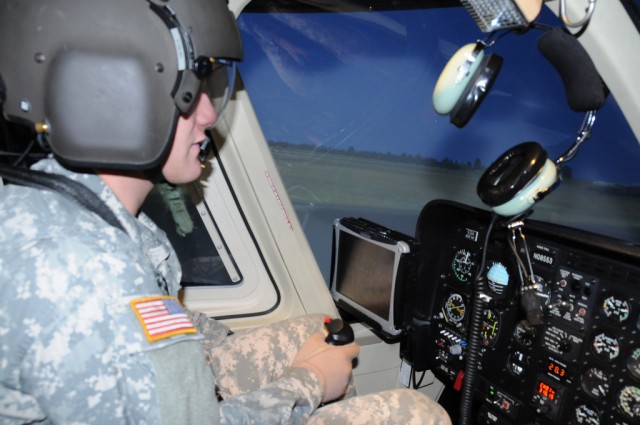FORT RUCKER, Ala. -- Maintaining sharp skills is one of the most important things flight school students can do in their downtime between basic warfighter school and advanced aircraft training.
The Sustainment of Aviator Readiness program, under the Directorate of Simulation, allows BWS graduates to do just that. SOAR is a new program undertaken by the U.S. Army Aviation Center of Excellence to sustain student pilot skills, according to Dan Farley, Warrior Hall Operations Team manager.
Students currently undergo a five-month flight training program, learning to fly the TH-67 Creek training helicopter. After they've mastered contact, instruments and basic combat skills in the TH-67, they are placed in advanced aircraft tracks to hone their skills in the UH-60, AH-64, OH-58D or CH-47, said Farley.
Student pilots sign up in pairs for time in the simulators at Warrior Hall, to average 1 A,A1/2 hours per week. The pilots fly one of four pre-determined scenarios that help them stay sharp in the pilot seat.
"This program was developed to provide each student pilot another great opportunity to sustain and practice their newly learned flight skills," said Lt. Col. Doug Brinson, DOS operations officer and SOAR program action officer. "One could think of the SOAR simulation period as an independent, peer-with-peer, practical exercise of previously learned skills."
Aside from keeping skills sharp, SOAR also helps Aviators become more confident while piloting an aircraft, said 2nd Lt. Daniel King, SOAR project officer.
"A pilot who can confidently use a radio is typically more confident in the cockpit," King said. "The SOAR program instills the positive habit of radio communication, thus building more confidence, and demonstrating to everyone outside of the cockpit that you are a competent and professional pilot."
SOAR began here in October and after Maj. Gen. Anthony G. Crutchfield, USAACE and Fort Rucker commanding general, was briefed on its success, it became mandatory for flight students in January, said 2nd Lt. Sean Brookshire, B Company, 1st Battalion, 145th Aviation Regiment flight student and former SOAR project officer.
Setting up the initial program was partially Brookshire's responsibility, but he also participated in the exercises. It currently supports 40 students a week, based on simulator availability.
"In the beginning, we worked on simple things like low-level navigations, cross-country flights and monitoring fuel levels," he said. "Then we added things like how to enter and exit flight patterns. We're basically setting them up for the next level of flying. At this stage, these are very perishable skills. This allows them to retain the knowledge as they move to their advanced aircraft."
Brookshire said there is no longer a solo flight in primary flight training, but SOAR can stand in for it without adding more pressure to flight students.
"Once we started and word started spreading, more and more Soldiers started signing up," he said. "It takes over as the solo flight. Soldiers get to plan their own routes and then fly them. They don't have to worry so much about mistakes because they can come back the next day and try again."
For more information on SOAR, call 255-6650.


Social Sharing